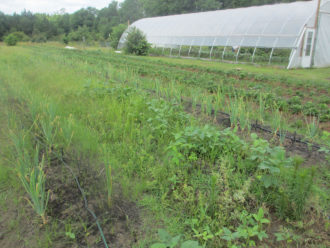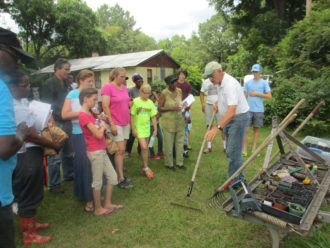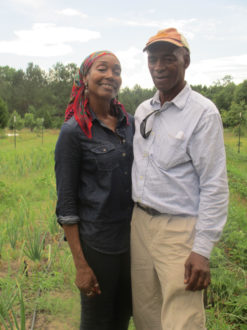GLENWOOD, Georgia – Bermudagrass may be popular among homeowners in the Southeast, but it is widely loathed by vegetable producers – especially those in organic production.
As a turfgrass, bermudagrass is valued for its durability, vigorous growth and tolerance to extreme weather conditions. But those characteristics also make it an obnoxious weed. Spreading rapidly by above-and-below-ground runners, bermudagrass can break the backs and the banks of producers faced with the challenge of controlling it.
Ron Gilmore and Jennifer Taylor of Lola’s Organic Farm in Glenwood, GA, are no strangers to bermudagrass on their USDA-certified organic farm. But through a Southern Sustainable Agriculture Research & Education (SSARE) Producer Grant, they found that cover crops are an effective means of controlling bermudagrass in organic production.
“When we came to this farm eight years ago, we were trying to grow cash crops. We were trying to grow vegetables and we kept running into this problem called bermudagrass. It just kept choking the life out of our plants,” said Gilmore. “I asked other local farmers who had the same problem what they were doing about it, and if they weren’t using Roundup or burning the entire acreage with fire, they were getting cultivators and doing intensive tillage and leaving it out to dry.”
Striving to become certified-organic left the couple with few non-chemical control options.
“You don’t want to dry out your soil by continuously tilling it and cultivating it without putting something back on it. You don’t want to leave the soil bare,” said Gilmore.
Because a healthy soil, rich in organic matter, provides the foundation for successful organic production, organic producers look to practical, integrated strategies to manage stubborn weeds while conserving and improving soil quality.
“We never really got the answer we wanted,” said Gilmore.
Then a unique collaboration with Georgia Organics, University of Georgia, and the Virginia Association for Biological Farming opened the doors to an idea: integrating cover crops in organic vegetable production to not only improve the soil, but also control weeds.
With the SSARE Producer Grant, the couple evaluated two non-chemical strategies to control and manage heavy bermudagrass infestations: cover crops and mechanical methods.
In one subplot, the soil was cultivated mechanically, including bottom plowing, tilling and weeding, and included hours of hand cultivating and raking to remove weeds. In another subplot, organic buckwheat was grown in the spring and summer, followed by a millet/cowpea mix in the fall.
In both subplots, Russian kale, Sapelo onions and Chandler strawberries were grown. The biological and mechanical methods were evaluated for their response to controlling bermudagrass, nutsedge and crabgrass. In addition, crop yields were measured.
In results of the two-year SSARE grant (FS13-267), “Mechanical and Biological Strategies to Remove Invasive Bermudagrass in Preparation for Organic Vegetable Production on Raised Beds,” it was shown that vigorous weeds can be suppressed by using integrated, intensive cover crop management strategies.
“The cover crop strategy seems to build healthy soil while suppressing weeds and increasing cash crop yields,” said Taylor. “The mechanical strategy removes weeds but it also reduces soil health benefits and decreases cash crop yields.”
However, Taylor indicated that there are opportunities for small organic producers to integrate both a strong biological method with light tillage and manual weeding for best effectiveness in controlling bermudagrass.
“Sustainable ag farmers should use strategies that work to also improve soil life and soil health,” she said.
Other considerations include: Extending cover crops between cash crops and along cash crop borders to manage weed growth, growing cover crops as a cash crop for the added benefit of improving soil function and reducing weed pressure, and using cover crops between cash crop rotations for an added sustainable ag benefit.
For more information on the grant project, search the national SARE database, or contact Lola’s Organic Farm at lolasorganics@gmail.com Results of the study will be presented at the Southern Sustainable Agriculture Work Group (SSAWG)’s 25th Annual Practical Tools and Solutions for Sustainable Family Farms Conference, Jan. 27-30, 2016 in Lexington, KY.
-- About Lola’s Organic Farm: Lola’s Organic Farm is a multi-generational family farm, named after Jennifer Taylor’s grandmother, who farmed the land as a sharecropper. She produced a wide variety of vegetables and fruit crops, and raised turkeys, ducks and dairy cattle. Jennifer Taylor and Ron Gilmore are in their 5th year as USDA-certified organic farmers. --
Published by the Southern Region of the Sustainable Agriculture Research and Education (SARE) program. Funded by the USDA National Institute of Food and Agriculture (NIFA), Southern SARE operates under cooperative agreements with the University of Georgia, Fort Valley State University, and the Kerr Center for Sustainable Agriculture to offer competitive grants to advance sustainable agriculture in America's Southern region. This material is based upon work that is supported by the National Institute of Food and Agriculture, U.S. Department of Agriculture, through Southern Sustainable Agriculture Research and Education, under sub-award numbers: FS13-267. USDA is an equal opportunity employer and service provider. Any opinions, findings, conclusions, or recommendations expressed in this publication are those of the author(s) and do not necessarily reflect the view of the U.S. Department of Agriculture.


